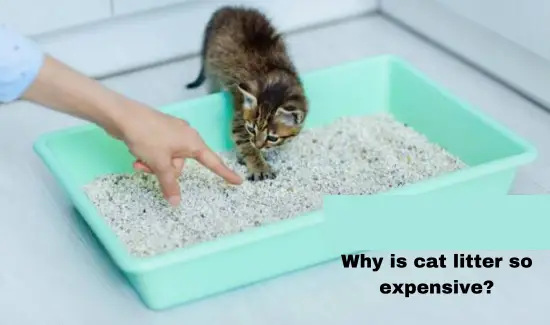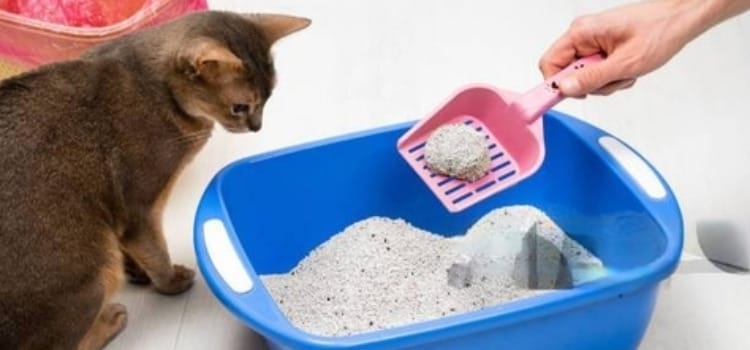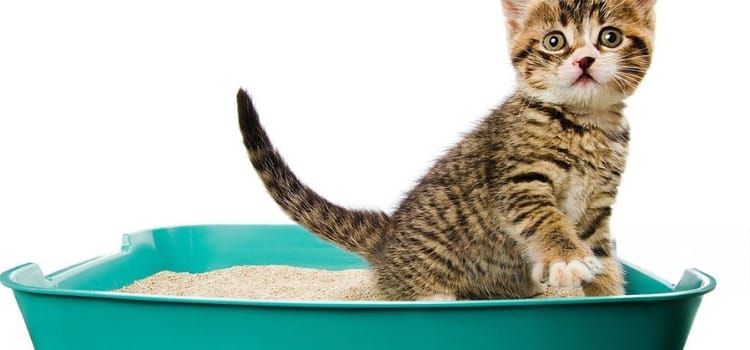Are you tired of holding your breath every time you walk past your cat’s litter box? We feel you! Dealing with the unappealing odor of cat litter can be a real challenge. But fear not because, in this blog post, we’ve got some fantastic tips and tricks to help banish that pesky smell for good!
From simple changes in your cleaning routine to exploring new products and techniques, we’re here to ensure your home smells fresh and clean while keeping you and your feline friend happy.
So, let’s dive in and discover how to stop cat litter from smelling – say goodbye to unpleasant odors once and for all!
Introduction To The Problem Of Cat Litter Odor:
Cat litter odor is a common issue that many cat owners face. It can be frustrating and embarrassing, especially when you have guests over. The strong and pungent smell of cat litter can linger in your home, making it unpleasant for you and your furry friend.
Several factors contribute to the problem of cat litter odor
Firstly, cats bury their waste naturally, meaning they often cover their urine and feces with litter. However, as the litter box gets used over time, the smell becomes more concentrated and overpowering.
Another factor is the type of litter used. Some litters may not effectively absorb odors or mask them well enough, resulting in a pungent stench that can be hard to eliminate.
Additionally, if you have multiple cats or live in a small space with limited ventilation, the ammonia build-up from urine can intensify the odor.
Not only is cat litter odor unpleasant for humans, but it can also affect your feline companion’s health. Cats have sensitive noses and respiratory systems; prolonged exposure to strong smells can cause discomfort and even health issues.
So, how do you stop cat litter from smelling? Fortunately, there are various solutions available that can help eliminate or reduce cat litter odor effectively.
In this blog post, we will discuss some practical tips and tricks on keeping your home smelling fresh despite having a furry friend using a litter box.
Understanding The Causes Of Cat Litter Smell:
Understanding the causes of cat litter smell is essential in finding ways to prevent and eliminate it. The pungent odor from your cat’s litter box can be unpleasant and overwhelming, making it a top concern for many pet owners. However, before we dive into solutions to stop cat litter from smelling, let us first understand the root causes of this spicy scent.
1.Urine And Feces Accumulation:
The primary cause of cat litter smell is the accumulation of urine and feces in the litter box. As cats use their litter boxes multiple times daily, these waste products build up quickly, leading to an overpowering stench. If not regularly cleaned or scooped out, the urine and feces will continue to emit a foul odor that can permeate throughout your home.
2. Poor ventilation:
Litter boxes that are placed in poorly ventilated areas tend to trap odors inside instead of allowing them to disperse. This is especially true for enclosed litter boxes or small rooms with limited airflow. Without proper ventilation, the air circulation cannot carry away the odors, causing them to linger longer.
3. Bacterial growth:
Another factor that contributes to cat litter smell is bacterial growth. Cat urine contains ammonia, which reacts with bacteria in the litter box environment, producing a strong and unpleasant scent. These bacteria thrive in warm and humid conditions, so if you live in a humid climate or do not change your kitty’s litter often enough, you may notice a foul smell from the litter.
Regular Cleaning And Maintenance Tips For A Fresh-Smelling Litter Box:
A fresh and clean litter box is essential for your and your cat’s well-being. It prevents unpleasant odors from permeating your home and ensures that your cat has a comfortable and sanitary place to do their business. Here are some regular cleaning and maintenance tips to keep your litter box smelling fresh.
1. Scoop The Litter Box Daily:
The first step in keeping your litter box odor-free is scooping it at least once daily. This removes any clumps or waste accumulated since the last cleaning. It also allows you to check the overall cleanliness of the box, ensuring no hidden messes or foul odors are lingering.
2. Replace Litter Regularly:
It’s recommended to completely change the litter in your cat’s litter box every one to two weeks, depending on how many cats you have and how often they use it. This will help prevent any buildup of bacteria or ammonia from urine, which can cause strong odors.
3. Use High-Quality Clumping Litter:
Clumping litters are designed to absorb moisture, making them easier to scoop and helping control odors better than non-clumping litters. Look for natural clay-based litter or those made with activated charcoal for extra odor-fighting power.
4. Clean The Litter Box With Mild Detergent:
Every time you remove the litter, thoroughly clean the empty box with warm water and a mild detergent. Avoid using harsh chemicals as they can be harmful.
Choosing The Correct Type Of Litter To Control Odor:
Choosing the correct type of litter is essential in controlling odor from your cat’s litter box. With so many options available on the market, it can be overwhelming to determine which one will work best for you and your feline friend. This section will discuss the different types of litter and their effectiveness in reducing unpleasant smells.
1. Clumping Vs Non-Clumping Litter:
One of the first decisions you must make when selecting a litter is whether to go with a clumping or non-clumping variety. Clumping litters can form solid clumps when they come into contact with urine, making it easier to scoop out and remove any odors. On the other hand, non-clumping litters are less effective in trapping odors and may require more frequent complete box changes.
2. Natural Litter Options:
Natural litters have become increasingly popular in recent years due to their eco-friendly properties and ability to control odor effectively. These types of litter are made from natural materials such as corn, wheat, paper, or pine pellets that are biodegradable and safe for cats and humans. They also have excellent absorption properties that help contain odors without adding chemicals or fragrances.
3. Scented Vs Unscented Litter:
Scented litters often have added fragrances to mask unpleasant smells from the litter box. While these may temporarily relieve odor, they can also be overpowering for some
cats’ sensitive noses and potentially cause.
DIY Solutions For Neutralizing Cat Litter Smell:
If you are a cat owner, you know that dealing with the smell of cat litter is often an unpleasant task. However, some simple and cost-effective DIY solutions can help neutralize the odor and make your home smell fresh again. Here are some practical tips for combating cat litter smell:
1. Baking Soda:
Baking soda is a natural deodorizer and can be easily found in most households. Sprinkle a generous amount at the bottom of the litter box before adding new litter. You can also mix it with the litter to help absorb any odors.
2. Activated Charcoal:
Activated charcoal is another natural ingredient known for absorbing odors. You can find activated charcoal in pet stores or online, which comes in different forms, such as powder or granules. Sprinkle some on top of the litter to help eliminate any lingering smells.
3. Vinegar:
White vinegar has strong antibacterial properties and helps neutralize odors effectively. Mix equal parts water and vinegar in a spray bottle to clean the litter box regularly.
4. Lemon Peel:
Citrus fruits like lemon are great for eliminating bad smells because of their acidic nature. After juicing a lemon, save the peels and leave them out to dry completely before placing them around your home near your cat’s litter box.
5. Essential Oils:
Some essential oils have powerful antibacterial properties that can help control odor
Commercial products and their effectiveness in eliminating litter odor
Commercial products have become increasingly popular for cat owners looking to eliminate litter odor. With various options available on the market, it can be overwhelming to determine which product is truly effective in combatting the unpleasant smell of cat litter.
Scented Litter:
One of the most common commercial products used for controlling litter odor is scented litter. These are traditional clumping or non-clumping litters infused with fragrances or deodorizers. While they may temporarily relieve unpleasant odors, they often contain strong chemicals and artificial scents that may irritate your cat’s sensitive nose and potentially cause health issues in the long run.
Box Sprays Or Powders Litter:
Another popular option is litter box sprays or powders. These products are designed to be sprayed directly onto the litter or added as an additional layer. Most sprays and powders claim to neutralize odors by absorbing them, but they often mask the smell rather than eliminate it.
Activated Charcoal Filters:
Activated charcoal filters are another commercial product frequently used in litter boxes. These filters work by trapping odorous molecules as air passes through them, effectively reducing the overall scent in the area around the box. While these filters can effectively minimize odor, they need to be replaced regularly as they lose their effectiveness over time.
Plant-Based Deodorizers:
For those who prefer a more natural approach, eco-friendly commercial products, such as plant-based deodorizers and probiotic solutions, are available. Plant-based deodorizers use natural ingredients like baking soda or essential oils to absorb and
Other Factors That May Contribute To Litter Box Odor And How To Address Them:
1. Poor Quality Litter:
The type and quality of litter used in your cat’s litter box can make a huge difference in controlling odor. Cheap, low-quality litter may need the ability to absorb moisture and trap odors effectively, leading to a pungent smell. Switching to a high-quality, clumping litter can help reduce odor significantly.
2. Inadequate Cleaning:
If you’re not regularly scooping your cat’s litter box, the waste will accumulate and cause an unpleasant smell. You should scoop out solid waste at least once or twice daily and completely change the litter weekly. Using a self-cleaning litter box can also make this task much more accessible.
3. Dirty Litter Box:
Even with regular scooping, if you’re not cleaning the entire box thoroughly every week, bacteria and germs can build up inside it, resulting in an offensive odor. Remove all the old litter, wash the box with hot water and mild soap, and then refill it with fresh litter.
4. Location Of The Litter Box:
If your cat’s litter box is placed in an area with poor ventilation or near sources of heat, such as radiators or heating vents, it can trap odors and make them linger for extended periods. Try moving the litter box to a more open space with good air circulation.
Conclusion:
As pet owners, we all want our homes to smell clean and fresh. However, living with a cat can sometimes make it challenging to maintain a pleasant-smelling home due to the litter box odor. But with the right strategies and products, you can keep your home smelling great while providing a happy and healthy environment for your feline friend.
Here are some key takeaways on how to stop cat litter from smelling:
1. Regular Cleaning Is Crucial:
The most effective way to prevent litter box odor is by regularly scooping out waste at least once or twice a day. This will keep the smell under control and ensure that your cat has a clean and comfortable place to do their business.
In addition, it’s essential to empty the litter box every week or two, depending on how many cats you have in your household. This will help eliminate any buildup of bacteria
and ammonia, which can cause unpleasant smells.
2. Invest In High-Quality Litter:
Choosing the correct type of litter is critical when controlling odor. Clay litters tend to be more absorbent than other options, but they may also produce more dust and tracking around the house.
Silica gel-based litters are another popular choice as they effectively absorb urine odors without producing much dust or tracking. However, some cats may not like the texture or scent of this type of litter.






[…] litter is to absorb unpleasant odors from your feline friend’s waste. If you notice a terrible litter smell after cleaning the litter box, the cat litter has expired. Bacteria can grow on expired kitty […]